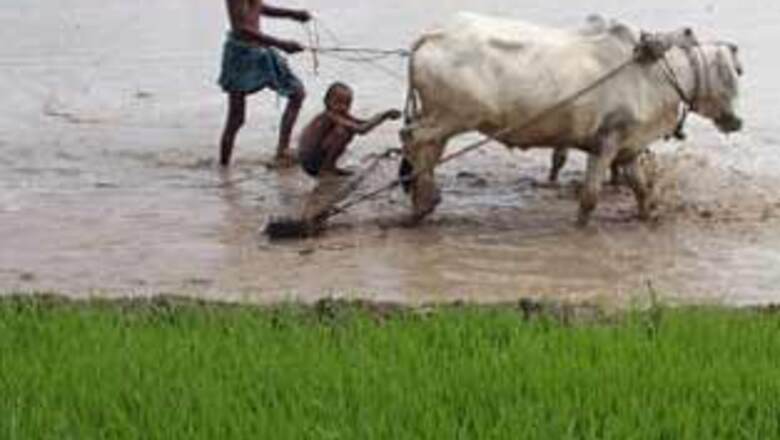
views
New Delhi: India's agriculture sector may get the funding it needs to realise its rich potential in the forthcoming Union Budget 2009, with big investments in irrigation and seeds aimed at boosting dismal productivity.
The budget will be unveiled on July 6 by the ruling Congress party, which won a bigger mandate in May on the back of rural support and has promised "inclusive growth", making this budget more likely to be farm oriented than in the past.
Credit Suisse, an internal financial services group, said in a recent report that the political environment was extremely favourable for pro-rural policies.
"We expect confirmation of this in the coming budget," it said, adding that irrigation and research and development in seeds were likely to get more funding.
Steps to boost agriculture would help meet India's rising demand for sugar, where it is the world's top consumer, and increase wheat output in the world's second biggest producer after China.
Indian farmers depend heavily on the monsoon rains as only 40 per cent of the cultivated area is irrigated, making the country vulnerable to sharp swings in crop output and a large importer or exporter of the same commodity in different years.
The country's sharp shift from being an exporter of 5 million tonnes of sugar last year to importing an estimated 2 million tonnes in 2009 has been the leading cause of a near 50 per cent rise in global sugar prices this year.
"The budget is going to be rural oriented. There is hardly any doubt. It makes good economic sense and political sense," said Dharmakirti Joshi, chief economist at rating agency CRISIL.
He said lower costs for subsidised fuel and fertiliser compared to last year would allow more spending on farms.
MONSOON SCARE
Worries about the monsoon, which in the first month saw rainfall 46 per cent below normal, have made it less likely the government will ease export curbs on wheat and rice, imposed in a panic in the past two years as stocks dwindled and inflation soared.
"Just look at the scare the delay in the monsoon has created. To derisk agriculture, you need to bring more area under irrigation. I think there will be some action in this sector," Joshi said.
Irrigation and high-yielding seeds helped output jump in the Punjab and Haryana in the "Green Revolution" of the 1960s.
"We have seen better irrigation facilities encourage farmers to invest in agriculture," said Anil Kumar Singh, deputy director general of government thinktank National Resource Management.
India's wheat yield is about 2.7 tonnes per hectare but varies from 1.9 tonnes in Madhya Pradesh and Bihar states to over 4.2 tonnes in Punjab and Haryana. This is still far below the yield of 8 tonnes in developed countries, and 6 tonnes in Egypt, where conditions are similar to many parts of India.
PAGE_BREAK
Similarly sugarcane productivity ranges from 59.6 tonnes per hectare in top producer Uttar Pradesh to 105 tonnes in Tamil Nadu, the No 3 producer, while Maharashtra, which is the largest refined sugar producer has an average yield of about 75 tonnes.
"We can take the example of Punjab, the state with the best irrigation facilities. The key to higher production or productivity in the state is irrigation," Singh said.
The prevalence of small farms with no mechanisation is another factor that limits productivity.
RURAL INCOMES
The government is expected to further expand the scope of the National Rural Employment Guarantee Act (NREGA) that boosted incomes and helped it win votes as it promised to give employment for a hundred days a year to every rural Indian without a job.
"Political economy would require more allocation for rural development or the NREGA. This is helping rural incomes," said T.K. Bhaumik, economic advisor for the JK Group.
"The government may link this with agricultural programmes to improve productivity," he said.
Higher rural incomes would allow debt-ridden farmers to afford more fertilisers and pesticides.
Bhaumik said the government was also likely to introduce a crop insurance scheme as promised by Prime Minister Manmohan Singhs' Congress party in its election manifesto.
The finance minister may also announce steps to boost sugar output.
"I believe there will be a mention of sugar in the budget. The budget may talk about long-term measures needed to overhaul the sector which needs immediate attention," said Sanjay Tapriya, Finance Director of Simbhaoli Sugars Ltd.
Vinay Kumar, managing director of the National Federation of Cooperative Sugar Factories Ltd, said mills had a long wishlist.
"We have suggested a host of steps for India's sugar sector and these include lifting restrictions on the sector."
Government restrictions include controls on price of cane, the amount of sugar that can be stocked or sold in the market and other curbs.

















Comments
0 comment